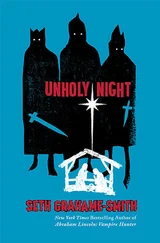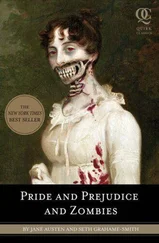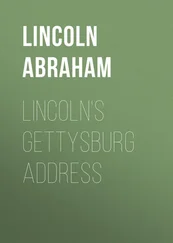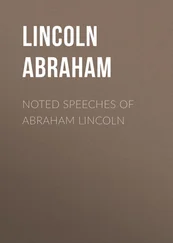His face bore none of the redness I had observed on the other customers as they hurried into the light and warmth of the saloon—nor had his breath been visible against the cold air as he entered. He was a pale gentleman of thirty years or less, but his hair was nonetheless a curled mix of brown and gray, the result being something like the color of weathered planks. He made straight for the barkeep (it was clear the two were acquainted) and whispered something to him, upon which the aproned little man hurried up the staircase. He was a vampire. He had to be—whiskey be damned. But how to know with certainty?
Abe was suddenly struck by an idea.
I barely spoke above a whisper. “Do you see that man at the bar?” I asked John, who had been occupied with the lady’s ear. “Tell me, can you ever recall seeing a man with such a repulsive face?” John—who had not the slightest idea what the man’s face looked like—laughed heartily all the same (such was his state). Upon my whispering this, the pale gentleman spun around and glared directly at me. I smiled back and lifted my glass to him. No other creature would have heard the insult over such a din, or across such a distance! There could be no doubt! Yet I could not take him. Not here. Not with so many people watching. I smiled at the thought of being dragged away and charged with murder. What would be my defense? That my victim had been a vampire? What’s more, my coat and weapons remained outside in my saddle bag. No—this would not do. There must be another way.
The barkeep returned with three women in tow and arranged them in front of the vampire’s table.
Having picked two of these, the vampire followed them up the staircase, and the barkeep rang out his last call.
Abe’s mind, half pickled with whiskey, churned until it received “the blessings of another idea.” Knowing that his brother would never leave him to wander the streets alone, he told John that he’d changed his mind and made “arrangements” to spend the night with a woman.
John had hoped (fervently, I suspect) that this would be the case, and promptly made his own arrangements. We bade each other good night as the barkeep snuffed out the lanterns and locked the bottles away. Having given my brother and his friend ample time to reach their room, I followed up the stairs, alone. Here was a single, narrow hallway lit dimly by oil light and papered with an elaborate pattern of reds and pinks. A number of doors ran down both sides, all of them closed. At the end, another closed door faced me which, judging by the shape of the building, led outside to a back staircase. I walked slowly down the center, listening for clues as to which room held my vampire. Laughter from my left. Profanity from my right. Sounds which I have not the words to describe. Having reached the end of the hallway with no success, I at last heard what I had been waiting for on my right side—the voices of two women coming from the same room. Leaving John to enjoy the warm embrace of a stranger, I turned back, headed out into the cold, and donned my long coat. I knew the vampire would likely finish his business and leave before sunrise. And when he did, I would be waiting for him.
But by the second hour of pacing in the street, he’d grown tired, cold, and bored.
The slaughter of sixteen vampires had left me rather audacious, I admit. Not content to wait any longer in the cold, I resolved to be done with it. I walked up the snow-covered staircase at the rear of the building, taking care to step lightly, and preparing the martyr in my hand.
“Martyr” was the name Abe had given to a new weapon of his own creation. From an earlier entry in his journal:
I have recently read of the successes of an English chemist by the name of Walker who has developed a method of creating flame using nothing more than friction. Having procured the necessary chemicals to reproduce his “congreves,” *I set about dipping a number of small sticks in this mixture. The chemicals having dried, I bundled twenty of the little sticks tightly together (the whole being roughly twice the thickness of a fountain pen) and soaked all but the tip of one end in glue. When the exposed end is struck against a rough surface, the resulting flame is brief, violent, and brighter than the sun. This has the effect of rendering my black-eyed adversaries temporarily blind, allowing me to chop them to pieces with greater ease. I have used them twice with tremendous success (though the burns on my fingers bear witness to earlier failures).
I stood before the door in question with the martyr in one hand and my ax in the other, light from beneath the door illuminating my snow-covered shoes. There were no voices coming from the other side, and I was presently struck by the thought of seeing the two girls slaughtered on the bed, their blood staining the sheets to match the patterned walls. Using the head of the ax, I knocked three times.
Nothing.
Having given them ample time to answer, I knocked again. Another moment passed with no noise from the other side. Just as I was weighing whether to knock again or not, I heard the creaking of the bed, followed by the creaking of someone walking across the wooden floor. I prepared to strike. The door opened.
It was him. Curly hair, the color of weathered wood. Nothing but a long shirt between his skin and the cold.
“What in the hell is it?” he asked.
Abe struck the tip of the martyr against the wall.
Nothing.
The damned thing failed to light, it having been left in the damp pocket of my coat for so long. The vampire looked at me quizzically. His fangs did not descend, nor his eyes blacken. But on seeing the ax in my other hand, they doubled in width, and he shut the door with such force as to rattle the whole building. I stood there, looking at the door like a dog looks at a book, all the while allowing the vampire time to escape on the other side. This having occurred to me at last, I took a step back and let the door have the full force of my heel. It sailed open with a tremendous noise—a noise I mistakenley [sic] attributed to the splintering of wood. I did not recognize it as a gunshot until after the lead ball had passed my head, missing it by no more than an inch and burrowing into the wall behind me. I will admit that I was a good deal shaken by this. So much so that on seeing him drop the pistol and climb out the window headfirst (his naked backside bidding me farewell) my first thought was not to pursue, but to examine my head lest I be bleeding to death. Satisfied this was not the case, I hurried into the room after him—the two ladies quite undressed and screaming in the bed next to me. I could hear doors opening down the length of the hallway as curious customers stepped out to investigate the commotion. On reaching the window, I saw my prey pick himself off the snowy street below and run barefoot into the night, slipping and landing on his bare hide at least twice before he escaped my view, screaming for help.
This was no vampire.
I cursed aloud most of the ride home. Never in my life had I been so embarrassed or made such a drunken error. Never had I felt like such a fool. If there was one comforting prospect, it was this: soon I would finally be free.
The winter of 1831 was an especially harsh one, but with March came the thaw, and with it the first birds in the sky and blades of grass on the earth. For Abe, the March thaw brought an end to twenty-two years with Thomas Lincoln. Years that had grown increasingly cold. It’s unlikely that they parted with anything more than a handshake, if that. Abe had only this to write on the day he left home for good.
Off to Beardstown by way of Springfield. John, John, and I hope to make the trip in three days.
Lincoln rode west with his stepbrother John and cousin John Hanks. The three young men had been hired by an acquaintance named Denton Offutt to build a flatboat and ferry goods down the Sangamon River to New Orleans, a round trip of about three months.
Читать дальше












